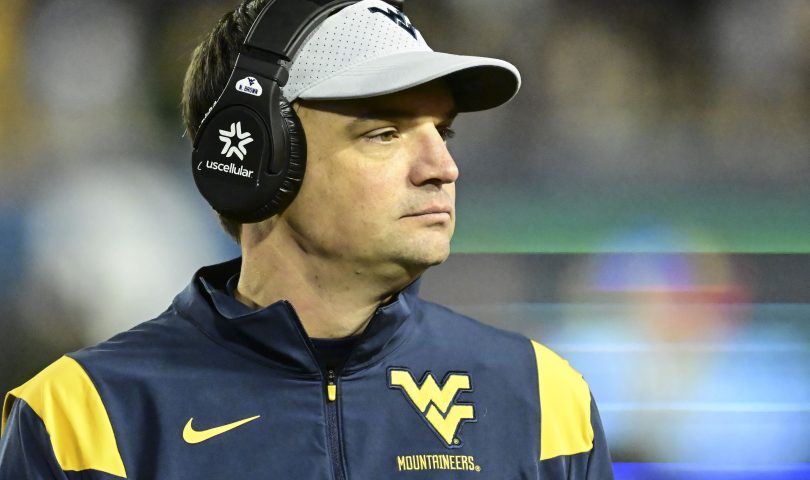MORGANTOWN — WVU head coach Neal Brown was in the Big 12 during college football’s last round of realignment in the early 2010s. As the offensive coordinator at Texas Tech, he saw the conference nearly collapse when the Big 12 lost Nebraska and Colorado in 2010 and then Texas A&M and Missouri in 2012.
This current bout of realignment, which culminated with several high-profile moves Friday night, looks a lot different for the Big 12. The conference added four new schools for 2023 and, despite losing Texas and Oklahoma, will grow to a 16-team league by bringing Colorado, Arizona, Arizona State and Utah into the fold next season.
“I’ve been really impressed with (Big 12) commissioner (Brett) Yormark since he took over. I think he’s been aggressive,” Brown said Saturday. “I don’t think enough credit goes to (former) commissioner (Bob) Bowlsby too. I thought the conference, by his leadership, reacted really quickly and added four really good programs to the Big 12 when Texas and Oklahoma initially left…Now we’re sitting at 16 teams and I think for the last several months we’ve been in a position of power, which has not always been the case. I think a lot of credit goes to (Yormark’s) leadership.”
The Big 12 wasn’t the only conference making additions Friday, as it was the Big Ten’s pillaging of the Pac-12 that set things into motion. Now the Pac-12, which has existed in some form or another for 108 years, is on the brink of collapse with just four members left beyond this year.
College football will never be the same as regional conferences go by the wayside in favor of lucrative media deals but Brown, for one, is willing to give this new era a chance.
“Different doesn’t mean bad,” Brown said. “I think sometimes we get used to things. We get used to watching TV a certain way, we get used to certain rules within college athletics, we get used to certain conferences and I think people in general don’t like change. But just because things are different, doesn’t mean they’re necessarily worse.”
Brown said fans’ connection to college football is through their university, not necessarily the conference they’re in or the teams they’re playing against.
“I do think some of the things that make college athletics great is there’s this connection,” Brown said. “Sitting there (Saturday) talking to people on fan day, a lot of the people that are coming are second, third, fourth generation Mountaineer fans that went to school here or grew up in the area and they really identify with the WVU logo, not necessarily with me as the head coach or with any of our players. They really identify with West Virginia because West Virginia represents the state, it represents the school they went to and I think there’s a lot more of that in college athletics.
“It happens in football more than not because there are certain memories that are attached to those,” Brown explained. “Football (games) are more special events. You have a lot more games in other (sports), so football games are events…They’re events and you get your memories and everything tied into those events.”
The biggest loss in conference realignment is the rivalries that make college athletics so meaningful. Washington and Washington State’s Apple Cup, Oregon and Oregon State’s Civil War and Oklahoma and Oklahoma State’s Bedlam will all be shelved for the time being, just as so many of WVU’s rivalries were in 2012.
“A lot of times those events are wrapped around rivalries, which I think are really good, but now that’s changing,” Brown acknowledged. “Maybe there’s going to be new rivalries. Maybe there’s going to be different things, we’re looking at basically four conferences now and they’re spread coast to coast. Maybe they’re different and maybe they can be better.”
Just like when the Big East dissolved in 2012, the Pac-12’s demise can be attributed to one thing, money.
“The short answer is we got here because of money,” Brown said. “That’s what it is, we can bitch and complain about it the money piece but last time I checked, most things are like that. It’s a business, the NFL is making most of their decisions on the bottom line too.”
When the Big East went under in 2012, WVU was one of the schools floating in limbo after not receiving an invitation to the ACC like so many of its contemporaries had. Ironically, it was WVU joining the Big 12 alongside TCU that helped the conference survive then as the pair boosted the league back up to 10 members and helped fend off poaching attempts from the Pac-12.
This time around the Big 12, and the Mountaineers by extension, were the ones doing the poaching.
“You either eat or you get eaten,” Brown said. “At least right now, from a West Virginia standpoint, we’re in the group that’s eating.”





